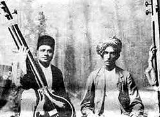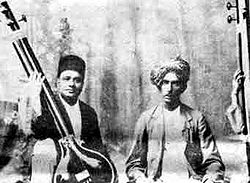
Abdul Karim Khan
Encyclopedia
Ustad Abdul Karim Khan (Devanagari
: अब्दुल करीम ख़ान, Urdu
: استاد عبدالکریم خان) (November 11, 1872–1937), was an India
n classical singer of the Kairana gharana (Kirana Gharana
).
, North India
) in to the Kairana
musical family which traced its roots to musician brothers Ghulam Ali and Ghulam Maula. His father, Kale Khan was the grandson of Ghulam Ali. Karim Khan received training under uncle Abdulla Khan and father Kale Khan. He also received guidance from another uncle Nanhe Khan. Apart from vocals and sarangi
, he also learnt Veena (Been
), Sitar
and Tabla
.
According to a story, he was initially a sarangi
player, but decided to switch to vocals because of low status of sarangi players. In early years he used to sing with his brother Abdul Haq. The Baroda ruler was impressed by this singing duo and made them the court musicians. This is where he met Tarabai Mane, who was the daughter of Sardar Maruti Rao Mane, a member of the royal family. When they decided to get married, they were ousted from Baroda. The couple settled down in Bombay. In 1922 Tarabai Mane left Abdul Karim Khan, which apparently had a major impact on his music - making it pensive
and meditative. Karim Khan's first wife, Gafooran was the sister of another Kirana master Abdul Wahid Khan, who was also his cousin.
 Ustad Abdul Karim Khan was invited to the Mysore court where he met famous Carnatic music Carnatic masters which also influenced his music. In particular the singing of his Sargam was a direct influence of Carnatic practice. He became a frequent visitor to Mysore Darbar which conferred on him the title Sangeet Ratna. On the way to Mysore he used to stay with his brother in Dharwad where he taught his most famous disciple Sawai Gandharva. In 1900 for eight months he taught Surashri Kesarbai Kerkar. Kesarbai Kerkar would go on to be one of the 20th century’s most renowned vocalists. In 1913 he founded the Arya Sangeet Vidyalaya in Poona to teach students. He would wholeheartedly teach all his students unlike other family ustads of the era. He finally settled down in Miraj
Ustad Abdul Karim Khan was invited to the Mysore court where he met famous Carnatic music Carnatic masters which also influenced his music. In particular the singing of his Sargam was a direct influence of Carnatic practice. He became a frequent visitor to Mysore Darbar which conferred on him the title Sangeet Ratna. On the way to Mysore he used to stay with his brother in Dharwad where he taught his most famous disciple Sawai Gandharva. In 1900 for eight months he taught Surashri Kesarbai Kerkar. Kesarbai Kerkar would go on to be one of the 20th century’s most renowned vocalists. In 1913 he founded the Arya Sangeet Vidyalaya in Poona to teach students. He would wholeheartedly teach all his students unlike other family ustads of the era. He finally settled down in Miraj
till his death in 1937 when returning from a concert tour of the south. Every year in August commemorative music concerts are held in Miraj.
The innovations he brought to his vocal style distinguishes Kirana style from others. The slow melodic development of the raga in Vilambit laya slow tempo was the most characteristic aspect of his music. He worked hard to maintain his voice to be sweet and melodious which shaped his music. The thumri style he developed as also quite different from the poorab ang or Punjabi ang. His thumri progresses in a leisurely languor with ample abandonment. He was also the first Hindustani musician to seriously study Carnatic system and probably the first to be invited to sing all over the south. He has even recorded a Thyagaraja Krithi. He was also influenced by Rehmet Khan of the Gwalior gharana and adopted the direct style of presentation Bhairavi of Rehmat Khan used to be bright and cheerful Karim Khan perfected it and was able to present an equally bright and cheerful rendering.
Devanagari
Devanagari |deva]]" and "nāgarī" ), also called Nagari , is an abugida alphabet of India and Nepal...
: अब्दुल करीम ख़ान, Urdu
Urdu
Urdu is a register of the Hindustani language that is identified with Muslims in South Asia. It belongs to the Indo-European family. Urdu is the national language and lingua franca of Pakistan. It is also widely spoken in some regions of India, where it is one of the 22 scheduled languages and an...
: استاد عبدالکریم خان) (November 11, 1872–1937), was an India
India
India , officially the Republic of India , is a country in South Asia. It is the seventh-largest country by geographical area, the second-most populous country with over 1.2 billion people, and the most populous democracy in the world...
n classical singer of the Kairana gharana (Kirana Gharana
Kirana Gharana
Kirana Gharana is one of the most prolific Hindustani khyal gharanas.-History:The name of this school of music derives from Kirana or Kairana, a town and tehsil of Muzzafarnagar District in Uttar Pradesh...
).
Early life and background
Abdul Karim Khan was born in Kairana village in muzaffarnagar (Uttar PradeshUttar Pradesh
Uttar Pradesh abbreviation U.P. , is a state located in the northern part of India. With a population of over 200 million people, it is India's most populous state, as well as the world's most populous sub-national entity...
, North India
North India
North India, known natively as Uttar Bhārat or Shumālī Hindustān , is a loosely defined region in the northern part of India. The exact meaning of the term varies by usage...
) in to the Kairana
Kairana
Kairana is a historical city and a municipal board and tehsil in Muzaffarnagar district in the Indian state of Uttar Pradesh.-Geography:Kairana is located at . It has an average elevation of 242 metres .It is also near of river Yamuna...
musical family which traced its roots to musician brothers Ghulam Ali and Ghulam Maula. His father, Kale Khan was the grandson of Ghulam Ali. Karim Khan received training under uncle Abdulla Khan and father Kale Khan. He also received guidance from another uncle Nanhe Khan. Apart from vocals and sarangi
Sarangi
The Sārangī is a bowed, short-necked string instrument of India which is originated from Rajasthani folk instruments. It plays an important role in India's Hindustani classical music tradition...
, he also learnt Veena (Been
Been
Been may refer to:*Pungi, an Indian wind instrument also called a been.*Rudra Veena, string instrument*Past participle of the verb "to be"...
), Sitar
Sitar
The 'Tablaman' is a plucked stringed instrument predominantly used in Hindustani classical music, where it has been ubiquitous since the Middle Ages...
and Tabla
Tabla
The tabla is a popular Indian percussion instrument used in Hindustani classical music and in popular and devotional music of the Indian subcontinent. The instrument consists of a pair of hand drums of contrasting sizes and timbres...
.
According to a story, he was initially a sarangi
Sarangi
The Sārangī is a bowed, short-necked string instrument of India which is originated from Rajasthani folk instruments. It plays an important role in India's Hindustani classical music tradition...
player, but decided to switch to vocals because of low status of sarangi players. In early years he used to sing with his brother Abdul Haq. The Baroda ruler was impressed by this singing duo and made them the court musicians. This is where he met Tarabai Mane, who was the daughter of Sardar Maruti Rao Mane, a member of the royal family. When they decided to get married, they were ousted from Baroda. The couple settled down in Bombay. In 1922 Tarabai Mane left Abdul Karim Khan, which apparently had a major impact on his music - making it pensive
Pensive
Pensive was a bright chestnut thoroughbred racehorse who in 1944 came closer than any other horse at the time to winning the U.S. Triple Crown...
and meditative. Karim Khan's first wife, Gafooran was the sister of another Kirana master Abdul Wahid Khan, who was also his cousin.
Career

Miraj
Miraj , is an historic town in southern Maharashtra, India. The history of the town dates back to the early 10th century, and the town is known for its rich tradition of Hindustani classical music and for religious harmony. It served as a stronghold and a strategic bastion because of its location...
till his death in 1937 when returning from a concert tour of the south. Every year in August commemorative music concerts are held in Miraj.
The innovations he brought to his vocal style distinguishes Kirana style from others. The slow melodic development of the raga in Vilambit laya slow tempo was the most characteristic aspect of his music. He worked hard to maintain his voice to be sweet and melodious which shaped his music. The thumri style he developed as also quite different from the poorab ang or Punjabi ang. His thumri progresses in a leisurely languor with ample abandonment. He was also the first Hindustani musician to seriously study Carnatic system and probably the first to be invited to sing all over the south. He has even recorded a Thyagaraja Krithi. He was also influenced by Rehmet Khan of the Gwalior gharana and adopted the direct style of presentation Bhairavi of Rehmat Khan used to be bright and cheerful Karim Khan perfected it and was able to present an equally bright and cheerful rendering.
Further reading
- Great Masters of Hindustani Music, by Susheela Misra, Hem Publishers, 1981. page 78.
- http://music.calarts.edu/~bansuri/pages/abdulkarim.html

